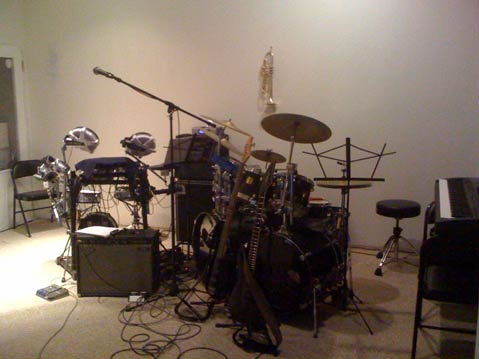A Resonating Resource
Get Your Music On

In a Goleta cinderblock building zoned for manufacturing, freshly painted walls vibrate with the enthusiasm of music aficionados. Gus Detar, Steve Stockmal, and their crew of highly qualified instructors have been fitting rooms with rock-out sound systems, setting up drum kits, and collecting guitars, pianos, and any other instruments they can get their hands on.

With no other studio like it in Goleta, the school offers training as well as a place for bands of all sizes and skill level to record their acoustic creations.
The studio’s name, Music Quest, nicely describes my own endeavor to calibrate my auditory processing abilities. I would say fine-tune had I some semblance of formal training. My formative years spent, I’m afraid I may have to make do with a zealous yet muted aptitude. Gus assures me, though, that with practice I can develop an ear.
Acquiring perfect pitch—the ability to correctly identify and categorize notes—is, like language acquisition, linked at least in part to a developmental timeline. Relative pitch, I learn, is the ability to identify notes after hearing a note of reference. This is what Gus is talking about when he says I can develop an ear. Apparently even people like me, despite missing the childhood window for a shot at perfect pitch, can acquire relative pitch and shake off the tone-deaf misnomer.
Aside from the swaggering confidence I might gain while appraising American Idol candidates, there may be some additional benefits to musical training. Because musical ability is likely related to language ability, honing one may also improve the other: Perhaps surprisingly, recent studies (see citations below) indicate that musicality is closely related to speech sounds, linguistics, and reading. The ability to extract speech from a noisy background is also connected with how the brain interprets sound, and influenced by musical instruction.
Speaking of which, the day I visited the music school, the background noise was coming from the hands of my own children. As I sat down with a guitar, my children migrated immediately to a nearby digital drum set. “This is great,” Gus told me, motioning to the flailing arms, legs, and sticks. “If we have rooms available,” he added, “one kid can get a lesson while their sibling jumps into another studio.” As he pulled the door shut, the cowbells, whistles, and rolling kabooms turned silent.
Steve and Gus have layered the walls of five studio rooms with varying sound-proofing material. They have put much thought and work into controlling noise while optimizing acoustics. “We get a slightly different sound out of each room,” Gus said. Some echo while others blunt resonance. Moreover, before the duo signed the lease they made sure the studio was outside the earshot of the residential community. “We can make as much noise as we want,” Steve declared. “When we start blasting planes out of the sky, that’s when we’ve reached our limit.”
While the building is nested in Goleta’s industrial area, it is still in the heart of town. “Our foremost goal is to provide a quality education for people residing in this area,” Gus told me. “And to provide an awesome space for bands to rehearse and practice.” With over 100 students enrolled, ranging in age from four to 74, the cadre of teachers is already carrying out these endeavors. The curriculum for all ages includes music theory, note reading, and technique.
One question that I initially neglected to ask was: Why (for them) is music important? This was an interesting oversight on my part as I usually relish discovering the root of people’s inspiration. While mulling over this little quandary, and the literature pertaining to music science, I stumbled onto a journal article that offered both explanation of my omission and an answer to the question itself.
The research article (by D.L. Bowling et al, published in the Journal of the Acoustical Society of America) explains that excited speech corresponds with musical intervals of a major scale. “Happy” is the term music professional’s have long ascribed to the sound of this scale. During the interview, the musician’s manner of articulation conveyed such a sentiment—so much so that I didn’t ask the obvious. I doubt that I can go back to my digitally recorded interview and accurately analyze the frequency intervals of said dialogue (at least not yet), but I can feel sure in saying that music makes them happy.
In an eleventh-hour conversation, I was able to ask my question. Their replies:
Steve said: “My life has been based on music. My friends, career, travel, experience, knowledge are all integrally connected to music. It’s fun, relaxing, exciting, inspiring all at once. It’s a great way to spend my days: laughing, learning, teaching. It makes for a full, happy life.”
Gus said: “Music is a way of expressing yourself on an emotional level in a way that words can’t do. It’s intellectually stimulating and a metaphor for anything you do in life: The struggle—to see where all your hard work goes, to produce or perfect something. Everything I like doing in life, I’ve got it in music.”
A list of relevant resources can be found at Lisa’s blog, Stimulating Aliquot
Websites:



